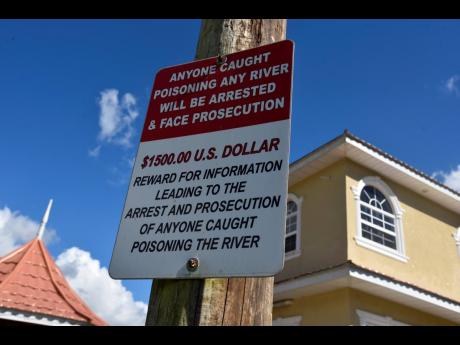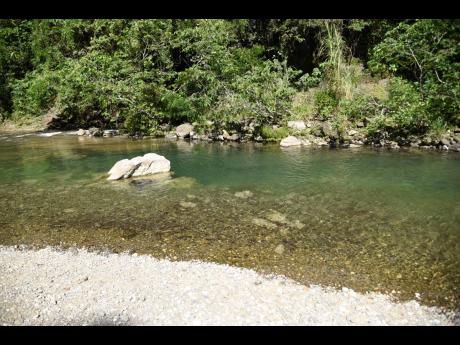Comfort Castle on edge as fish kills threaten way of life
NEPA says poisoning probes derailed by insufficient evidence
Residents of Comfort Castle, Portland, are calling for the Government and other relevant authorities to impose an extended ban on fishing in the Rio Grande in their community as the treasured black janga/black Betty crayfish may soon become extinct...
Residents of Comfort Castle, Portland, are calling for the Government and other relevant authorities to impose an extended ban on fishing in the Rio Grande in their community as the treasured black janga/black Betty crayfish may soon become extinct.
That concern has been sparked by allegations of repeated poisoning of the river with the objective of a mass crayfish kill for resale. That claim has been made against at least one resident, say concerned citizens in the community, but there has been no viable evidence provided for arrest or prosecution.
“We want a five-year ban on the river! It’s being poisoned so often, and all of that, so we would a wish if we can get a five-year ban on it. That mean say nobody fishing on the river, and so forth, so things can get fi come back and manifest a way,” Kemar Failey, a resident, said.
“It might sound a way to who really fishing, but at the end of the day, it a go in abundance weh everybody can get … . Right now, if you throw some food out there, nothing not picking it because no fish no inna di water,” he said.
Failey and others have expressed disappointment with the pace of investigations by environmental regulator the National Environment and Planning Agency (NEPA) into the allegations.
They claim to have seen no tangible results from its probe.
In an emailed response to questions from The Gleaner regarding the complaints of residents, NEPA stated that the agency received one report on June 10, 2022, from the local health department on the matter.
“The agency also stated that they received reports in the past regarding poisoning of rivers and streams to fish for janga/crayfish. Most of these reports are from the parishes of Portland and St Thomas. In all cases, the agency has investigated. The investigations have been derailed chiefly by insufficient evidence,” the regulator said.
That response offers no solace to Comfort Castle resident Errol Gray, who said he has been aware of reported poisoning and its deleterious effects on the marine population.
As he stood in a section of the Rio Grande during the Gleaner interview, Gray said that schools of crayfish would swarm that very spot a decade ago. Now, the numbers have been significantly reduced.
“From a child coming up, I always hear about them poisoning the spring dem, and so forth, and I really want it to stop because when my child come up, they’re not going to know anything about crayfish or janga,” Gray said.
“I really want to see our community developed again because normally, we used to catch it, sell it, and so forth – parch it. We boiled it as well.”
Returning resident Junior White is upset that the police have not able to arrest and charge unscrupulous persons who allegedly poison the river, despite an offer, made a few months ago, of a cash reward for witnesses to point out the perpetrators.
He said the nearby Cocoa Spring River with the black janga was poisoned recently.
“That river is where the reservoir is that feeds the community – Millbank, Comfort Castle, and Ginger House. I left my workplace here and I went to the scene and there we discovered numerous amount of janga that was poisoned in the water,” White said.
White also said he collected bags of crayfish and took them to the nearest police station. The suspect, they said, was warned.
The samples were then handed over to the National Environment and Planning Agency.
“And that’s where it stops!” White told The Gleaner.
He said the Dam-Dam Spring – the home of black janga – once teemed with schools of nine species of fish.
NEPA said that it has, in recent times, embarked on a series of initiatives, including the introduction of community-based monitoring systems.
“Key community groups are introduced to biomonitoring techniques, which allow for bolstering involvement in reporting on impacts on rivers and increased appreciation for our freshwater resources. This approach is anticipated to enhance communication outreach activities through which community members are adequately informed on the disadvantages of unsustainable harvesting practices,” the environmental watchdog said.




